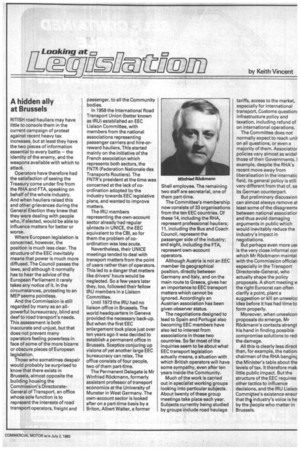1 .-- 7 Looking at i=f Z m,(? L—rC:°-7Q7BH z LC ED
Page 69

If you've noticed an error in this article please click here to report it so we can fix it.
by Keith Vincent
A hidden ally at Brussels
RITISH road hauliers may have little to console them in the current campaign of protest against recent heavy tax increases, but at least they have the two pieces of information essential to every battle — the identity of the enemy, and the weapons available with which to attack.
Operators have therefore had the satisfaction of seeing the Treasury come under fire from the RHA and FTA, speaking on behalf of the whole industry. And when hauliers raised this and other grievances during the General Election they knew that they were dealing with people who, if elected, would be able to influence matters for better or worse.
Where European legislation is concerned, however, the position is much less clear. The structure of the EEC inevitably means that power is much more diffused. The Council passes the laws, and although it normally has to hear the advice of the European Parliament it rarely takes any notice of it. In the circumstances, protesting to an MEP seems pointless.
And the Commission is still regarded by many as an allpowerful bureaucracy, blind and deaf to road transport's needs. This assessment is both inaccurate and unjust, but that does not prevent many operators feeling powerless in face of some of the more bizarre or obscure pieces of European legislation.
Those who sometimes despair would probably be surprised to know that there exists in Brussels, almost opposite the building housing the Commission's DirectorateGeneral of Transport, an office whose sole function is to represent the interests of road transport operators, freight and passenger, to all the Community bodies.
In 1958 the International Road Transport Union (better known as IRU) established an EEC Liaison Committee, with members from the national associations representing passenger carriers and hire-orreward hauliers. This started mainly on the initiative of the French association which represents both sectors, the FNTR (Federation Nationale des Transports Routiers). The FNTR's president at the time was concerned at the lack of coordination adopted by the industry towards EEC legislative plans, and wanted to improve matters.
The IRU members
representing the own-account sector already had regular c.Antacts in UNICE, the EEC equivalent to the CBI, so for them the problem of coordination was less acute. Nevertheless, their UNICE meetings tended to deal with transport matters from the point of users rather than of operators. This led to a danger that matters like drivers' hours would be neglected. So a few years later they, too, followed their fellow IRU members in a Liaison Committee.
Until 1973 the IRU had no liaison office in Brussels. The world headquarters in Geneva provided the necessary back-up. But when the first EEC enlargement took place just over ten years ago it was decided to establish a permanent office in Brussels, Sceptics conjuring up visions of yet another large EEC bureaucracy can relax. The office consists of four people, two of them part-time.
The Permanent Delegate is Mr Winfried Rockmann, formerly assistant professor of transport economics at the University of Munster in West Germany. The own-account sector is looked after on a part-time basis by a Briton, Albert Walter, a former Shell employee. The remaining two staff are secretarial, one of them part-time.
The Committee's membership now consists of 33 organisations from the ten EEC countries. Of these 14, including the RHA, represent professional hauliers; 11, including the Bus and Coach Council, represent the passenger side of the industry; and eight, including the ETA, represent own-account operators.
Although Austria is not an EEC member its geographical position, directly between Germany and Italy, and on the main route to Greece, gives her an importance to EEC transport matters which cannot be ignored. Accordingly an Austrian association has been given observer status.
The negotiations designed to lead to Spain and Portugal also becoming EEC members have also led to interest from associations in those two countries. So far most of the inquiries seem to be about what EEC transport legislation actually means, a situation with which British operators will have some sympathy, even after ten years inside the Community.
Much of the work is carried out in specialist working groups looking into particular subjects. About twenty of these group meetings take place each year. Subjects currently being studied by groups include road haulage
tariffs, access to the market, especially for international transport, Customs question: infrastructure policy and taxation, including refund of on international operations.
The Committee does not normally expect to reach unit on all questions, or even a majority of them. Associatior policies vary almost as widel, those of their Governments. I example, despite the RHA's recent move away from liberalisation in the internatic field, its general policy is still very different from that of, sa its German counterpart.
But preliminary discussion can almost always remove at least some of the disagreemE between national associatior and thus avoid damaging arguments in public which would inevitably reduce the industry's impact in negotiations.
But perhaps even more us( is the very close informal con which Mr Rifickmann maintai with the Commission official: especially in the Transport Directorate-General, who actually shape the policy proposals. A short meeting ■A the right Eurocrat can often clarify a point, plant a suggestion or kill an unwelco idea before it has had time to form properly.
Moreover, when unwelcon proposals do emerge, Mr Rockmann's contacts strengt his hand in finding possible compromise solutions to red the damage.
All this is clearly less direct than, for example, the nation; chairman of the RHA banginc the Minister's table about the levels of tax. It therefore mak' little public impact. But the structure of the EEC requires other tactics to influence decisions, and the IRU Liaisoi Committee's existence ensur that thl industry's voice is he by the pleople who matter in Brussels.




































































































